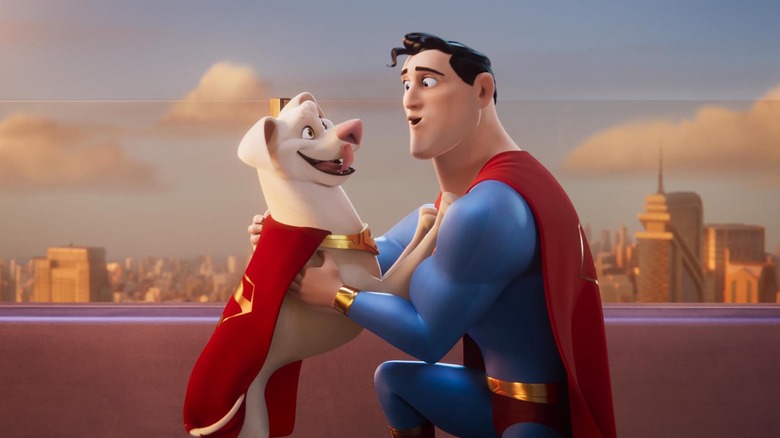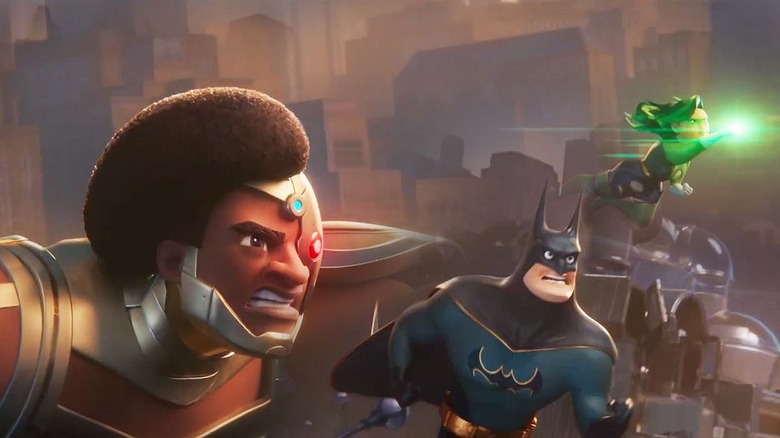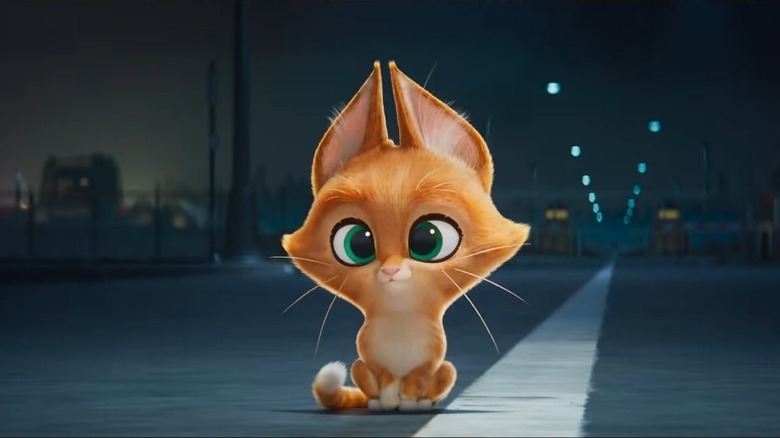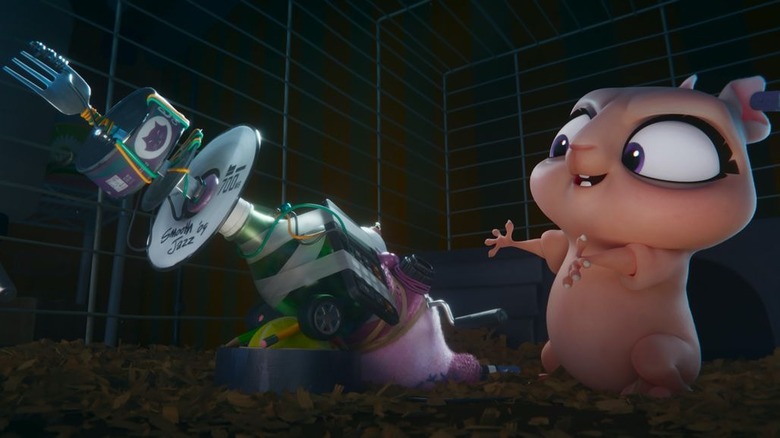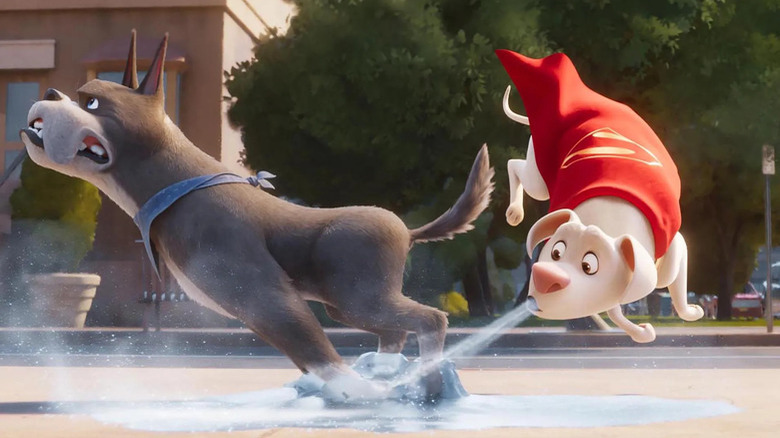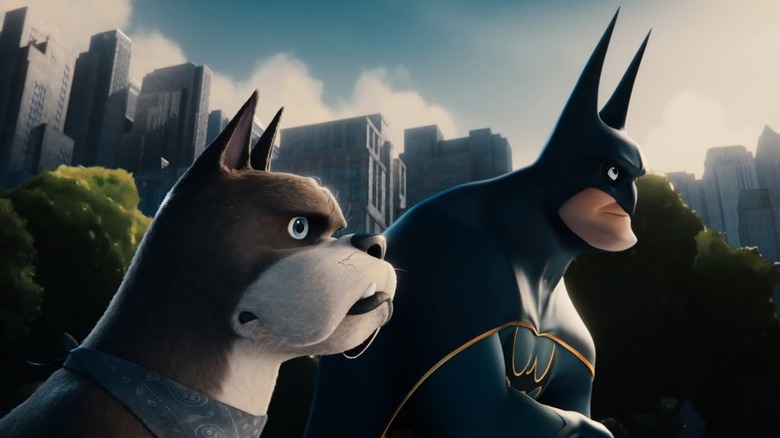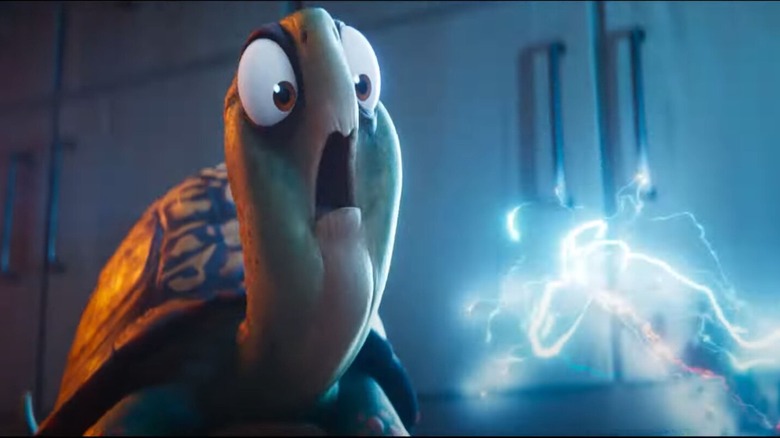DC League Of Super-Pets Director Jared Stern Built The Story Around Superman's Best Friend [Interview]
"DC League of Super-Pets" isn't writer and co-director Jared Stern's first step into the world of DC Comics. Years ago, he was one of the co-writers behind "The Lego Batman Movie." He knows the DC world well, especially after having worked on his latest animated super-pets movie for the last decade or so. As he told us, DC was nothing but supportive in letting him poke fun at their characters, and even suggested Lex Luthor as one of the villains.
Stern co-directed "DC League of Super-Pets" with Sam Levine, a longtime animator and story artist. With a large army of animators, the directors made a family film with some actual surprises, such as references to "Nightmare on Elm Street" and "The Warriors." Plenty of animated movies for kids have their share of pop culture jokes, but how many kids movies these days reference those '80s classics?
Ahead of "DC League of Super-Pets" arriving in theaters this weekend, we talked to Stern about those references, watching Keanu Reeves voice Batman, and how he bonded with Dwayne Johnson over the great Sturgill Simpson.
''I'm already lucky.''
How are you feeling on opening day?
I'm a trail runner. I like running up in the hills where I get no cell service and I kind of just wanted to go up there for the entire ... I couldn't run for the entire day, but I was gone for at least a couple hours, so that was good.
Well, I don't think you have much to worry about.
It's a weird thing. To use the running metaphor, you spend years training for a race and then it's race day and you don't do the race. It's out of your hands entirely. I don't have children, but it's somewhat what I would imagine it's like to be a parent. You spend all this time trying to raise your kids right, but ultimately they go out into the world and you can't control it anymore.
The thing that I keep reminding myself, and it really is true, is because people kept on saying, "Good luck today. Good luck today." I'm like, "I'm already lucky." I made something that I'm proud of within this current studio system, which is hard to do and I had a great time doing it with really good people, and that's rare. It'd be nice if it was a big hit, but that part... I already won.
You got some surprising jokes and choices in this movie. Even hearing Sturgill Simpson's music in this was a pleasant surprise. How'd that come about?
That was one of the first things that I sort of bonded/he gave me s*** over with Dwayne Johnson, because he's a country music guy. He asked early on, when I first met with him, our very first meeting, "How did I see the music for this?" It was pretty early, so I said, "I'm not really sure. I know there's this one song that I've already started playing around within this sequence that I really like by Sturgill Simpson." Then he was like, "I love Sturgill Simpson, what is it?" And I told him, and it's on one of his more recent albums.
"Sound and Fury," a great rock album.
I love that album, but for purists, Dwayne was more of an old school fan. He was like, "Nah, man, that's him doing techno." [Laughs] And I was like, "No, it's still great." And then of course his last couple albums, he went even more stripped down, bluegrass, which I love too.
Anyway, that's in the movie because I'm a fan of Sturgill and I think I was probably running and listening to it. I'm like, "We should try that in that sequence. I think that could be fun for that scene."" It worked. And then it was fun to bring it back at the end when the pets were clicking in the same way that the Justice League is clicking earlier, so we got to bring it back around a second time.
''We just wrote a ton of lines for her''
Another surprise is a reference to "A Nightmare on Elm Street." Was that always there?
I think we were just playing around. We knew we were going to get in Winona [Bradshaw], who plays the kitten, who's awesome. Winona, she's my friend's daughter, and she did an amazing job. We had her in there as the temp stuff, and then when she was coming in to do the production thing, we just wrote a ton of lines for her.
Even though she's an adorable kitten, she's like a monster in a horror movie. What are some fun things for her to say? We put in the "Warriors” reference, and then I was like, "We could play with 'Nightmare on Elm Street,' that could be fun too." It actually surprised our music people at Warner's, because they were like, "Wait, you didn't tell me we were putting this in here." This is technically a song from "Nightmare on Elm Street," which I think was a New Line movie so Warner Bros. owns it, but we had to go through the process of doing it. Luckily, we were able to use it, but it was just a fun little playful thing that we were able to use.
Also, funny for adults, but if a kid hasn't even seen "Elm Street" yet, it'd just be a funny, odd joke to them.
Exactly. I talk about it all the time. I don't ever want it to feel like, "Oh, this moment is for kids and this moment is for adults." I want the whole movie for everybody, and that doesn't mean that there won't be things that play at a certain level. But like you said, I think a kid is still going to find that moment fun.
I think about when I was a kid and I watched "Airplane." I didn't get 90% of the references and I laughed the entire time. It's that good. I think "The Simpsons” was the same when I was a kid. I wasn't getting the Harvard Lampoon jokes, but I was loving it. Oftentimes you learn stuff that way. I discover things. It was like, "Okay, what is this mocking?" Okay, and then you go back and that's how you kind of learn. You're like, "Okay, that's 'Saturday Night Fever.' That was a movie about disco dancing."
''Guinea pigs ... would have a chip on their shoulder''
Were guinea pigs always the villains?
Pretty early on. It was a nice thing that we came to realize, well, guinea pigs are someone who would have a chip on their shoulder because they're always test subjects. I think it got really good, and it came through meeting with DC, because originally I was more limited in my thinking. I didn't think we could have that much stuff from DC to play with, but they were the ones who said, "Well, what about Lex Luthor?"
It made it so much more personal that not only was she a guinea pig in a lab, but it was Lex Luthor's lab. And then, what is her relationship with Lex? I think the whole villain story got really good when it started to mirror what we cared about: a pet and their owner, the same way that Krypto has his story with Superman.
Was DC always open? They've vetoed jokes before with "Harley Quinn," but they were completely OK with jokes at their characters' expense?
Yeah. Like I said, it often surprised me where instead of them saying, "You can't do that," it was like, "Have you considered doing this?" Which was great. We were trying to always be respectful. We wanted to push it and play with the characters, but we didn't want to push it so far that the people who really loved those characters would bristle too much at it. It's tricky, but I think DC was a good barometer for that. They know how far you can go with their beloved characters, and so they were really helpful as we developed it.
Our guiding principle was, okay, this is a movie about their pets. Let's lean in that direction. I mean, there's some fun world jokes that could work in any DC satire. But for the most part, we're like, "Okay, let's figure out how to make these characters fun in a specific way for Superman as a pet owner, or Batman as a guy who really could use a pet." That idea helped drive our story.
You pitched the story 10 years ago, right? How was it first received?
I think it was 10 years ago. They liked it enough for me to continue moving forward with it. It was just that we were starting this thing called WAG that was, at the beginning, a brain trust. Similar to the Pixar-Disney story trust where they brought in a bunch of people they'd worked with before, writer/directors. It was me, Phil Lord and Chris Miller, [John] Requa and [Glenn] Ficarra who directed "This Is Us” and a bunch of other great stuff. And then Nicholas Stoller, who did "Forgetting Sarah Marshall" and "Neighbors."
I was by far the least accomplished of all of those people and very happy to be there and just learn from them. We'd have these long dinners where we'd talk about the project we're working on and other stuff. I'd hear everything that was going on in their lives and be like, "Okay, that's interesting." Just the stuff that people at the next level would talk about, things that I hadn't been through yet that I'm just going through now, like marketing or publicity for a movie, and testing. Stuff that you don't know until you know.
Anyway, they were all super accomplished and had great ideas, so it made sense for those movies to move forward first. We made "Storks" and all the "Lego" movies, of course, and "Smallfoot." And then it just took a little while, but then mine came up next.
''You can fall out of love with a joke''
Even when movies start getting animated, they can change so much. What were some of the story changes along the way?
There were a lot of changes. I think the biggest change was that I had too much story. I was trying to do too much. I think Ace had more story in the movie, and it was all good, but it was too much. It almost felt like there were two A stories and I kept fighting it because it was good stuff. It was emotional and I liked it. In some ways I started from that story, but it became clear that the real A story of the movie was between Krypto and Superman and that everything needed to support that.
Ace still has a great arc in the film, as do all the other characters, the Justice League, the other pets, I hope. The goal was to have those arcs really feed into the main story of Krypto and Superman. They do. Ace has his story now, but it's about help, and the villain as well. They're all feeding into the notion of pets and owners losing their love, trusting them, loving them no matter what.
Once that coalesced, right, this is the A story and all the other ones need to rotate around it and feed into it and they can be great in their own thing. That was the biggest change and looking back now, it seems so obvious and that can be frustrating, but that's the great thing about making these movies. You get those four years to make those mistakes and figure it out.
You had a lot of flexibility with the jokes, too, right?
Yeah. Always trying something new and it's tricky because you can fall out of love with a joke that's a great joke just because you've heard it so many times. The executives you're showing it to, that can happen. It can happen to you. We made this movie during a pandemic, so we didn't screen it in front of a lot of people as much as we normally would to get feedback, especially a comedy, to feel if jokes are working in a room.
We had to go with our gut a lot and that being said, you can never settle and you can never just go, "Okay. That joke works." We were adding stuff up until the end. I think one of the biggest laughs in the movie came at the very, very end where Merton (Natasha Lyonne) says, "Prenup." I love that joke, and that came in at the very end. Yeah, we're working. Not just comedy, we're trying to improve the story, trying to make it better up until the very last second that we have.
''He was psyched, like a kid in a candy store, to be Batman''
It's easy to imagine an alternate universe in which Keanu Reeves actually played Bruce Wayne. How deep did he go into the role?
It was so cool. I mean, I'm such a huge fan. I was very nervous at first, but he very quickly set me at ease. I remember the first time we recorded him, he was doing stunt work, maybe rehearsals for "John Wick 4" in Berlin. And so, he was coming from a day of fighting and I said to him something like, "Well, hopefully this will be a little easier. We're just talking in a booth." He said something like, "Nothing's easy," which I loved, because it means he's going to be as committed to this and he cares about it.
Most importantly, he loves comics. He loves Batman. He was psyched, like a kid in a candy store, to be Batman. He had a lot of fun with it. When he started cracking himself up, not all the time, not one of those people who breaks on everything they say, but every now and then he would laugh, and I was like, "He's having fun." That's good. I'm glad that Keanu is having fun.
Sometimes, because, like I said, COVID with all these weird schedules, he was in Berlin. Sometimes I would either stay up or wake up at 3:00 in the morning to record him for an hour. Normally, that would be the most miserable experience ever to have to wake yourself up at 3:00 in the morning. In this case, I was like, "Oh, this is so fun. I get to win." The alarm would go off and I'd be like, "Oh, this is so cool. I'm going to record Keanu Reeves."
Obviously, it's such a different skill set compared to live-action acting. What skills does a movie star have to bring to a voice booth? Here, you have a lot of movie stars and people you know, some of them you don't even realize until the end credits.
That's always my goal. I've seen some stuff on Twitter, especially in the last few days, from people who I really respect that are like, "Why does every animated movie need to be big giant celebrities?" I think when they're medium celebrities, they're famous, but they're not quite The Rock and Kevin Hart famous, then maybe people are more accepting of it. Certainly, it's been happening and not just in our movie. I mean, Steve Carrell is in "Minions" and you watch "Toy Story" and it's like, "That's Tom Hanks." There's no bigger star than Tom Hanks. But for me, when I watch "Toy Story," I don't think of Woody, the cowboy, as Tom Hanks, I think of him as Woody.
To your point, that's the ultimate compliment when someone says, "I just got lost and that wasn't Dwayne Johnson, it was Krypto." I was watching that character or some of them, you didn't even know who it was until the end. Those are the best and that's how we approach it. When we're casting, we don't try to cast someone just because they're famous. I know it seems like it with our movie because we have so many famous people in it. I'm sure that made our marketing people very happy, but that's not why we did it.
We, first and foremost, listened to their voice. Just because someone's a great actor that has a type, they might not have the right voice for voice acting. We listened to that and we put the voices against each other to see how they play, and we want to make sure they are a great voice actor. It is a different skillset. I have great respect for people that are primarily voice actors, and there are people in this movie that are not famous as well that did a great job, like [Winona Bradshaw as] that kitten.
Sam, who's my co-director, is really funny as that Boston terrier. There's a lot of ways you can do it. All I can say is in our movie, it was really something that we cared about. It came from the heart. It was not cynical in any way. We just were trying to tell a great story and cast a movie, just like you'd cast any movie, animated or not.
''You never want to do something flashy for the sake of flashy''
Like you said, you constantly could tweak the jokes, but what about the action? Once the animators start working on those set pieces, is there much time for changes?
It sort of gets plussed over time and that's a fun one. For example, the scene where you meet the Justice League, I wrote that on the page. I hate writing action scenes because I don't think I'm very good at it, but that was one of the ones that my co-director, when he read the script, he was like, "I'm psyched to make this movie." Which touched me, because I was like, "I wrote a good action scene!" [Laughs] Sam [Levine] thinks really visually, he's an animator, an artist. I was psyched that he felt that way.
Then it goes to a story artist and [Vi-Dieu Nguyen], who's really awesome. He worked on "Spider-Verse” before our movie, we saw his work in that, and we were like, "Yes, please." He did the sequence in that where Spider-Man's getting dragged by the train along the elevated train tracks, among many others. He was like, "I feel like maybe this could be a oner. It could all be one shot." I'd written the action, the handoff, and then this happens, and that happens, but I didn't have any kind of camera suggestions in the script. We were like, "Yes, please try that." And so, he tried to do it in very simple storyboards, simple but expressive, and he really nailed it.
Then it goes to the layout people. The layout people, they're cinematographers. They love every moment, and if they've got two guys talking on a rooftop, they're going to do a good job of giving you over-the-shoulder shots. But when they get a oner through space, obviously it's going to take them way longer. It's going to be super hard, and they just light up. They're like, "This is going to be awesome." And then they bring so many ideas to it in figuring out how to make that work, and it's pretty cool.
I mean, it's happening more and more in live-action movies, where a lot of it is animated too, but the camera can do whatever you want, which is both freeing and also can be insane. Anyway, that one just got better and better through every step of it, and I love how it came out.
Most importantly, is the storytelling right? You never want to do something flashy for the sake of flashy. You love seeing a great action scene, but there is a method to that madness. There's a point to that scene being cool, feeling like, "Oh my God, they're passing like a perfect team that's just effortlessly passing the ball to one another." You want to feel like the Justice League so perfectly in sync, in juxtaposition to our super pets who are garbage when they start, until the end of the movie and then they have action moments that are meant to then echo that scene. We tried to echo it in the camera work later. It was all for a storytelling purpose, but also pretty cool.
"DC League of Super-Pets" is now playing in theaters.
